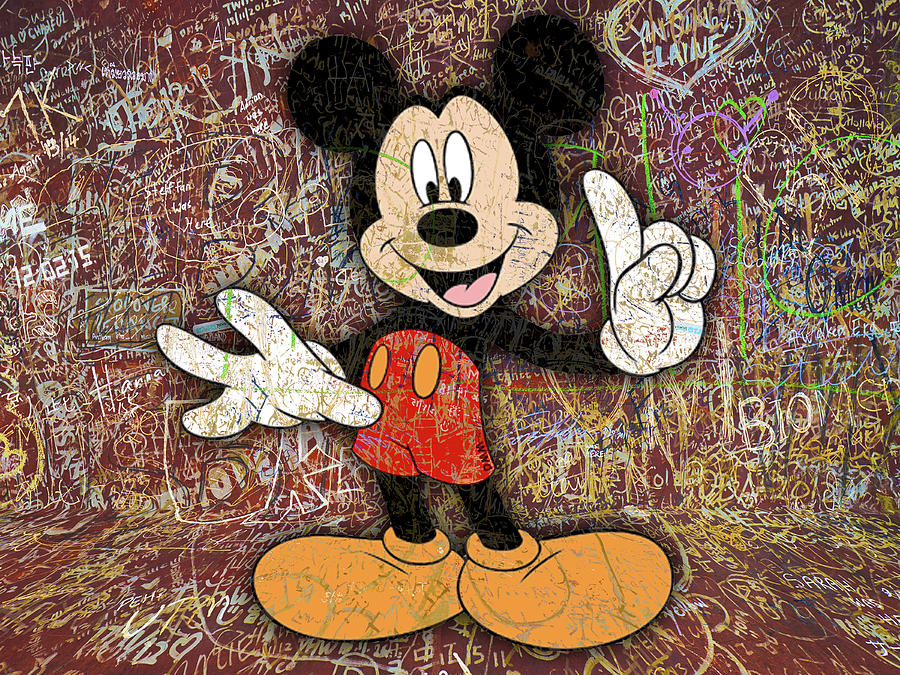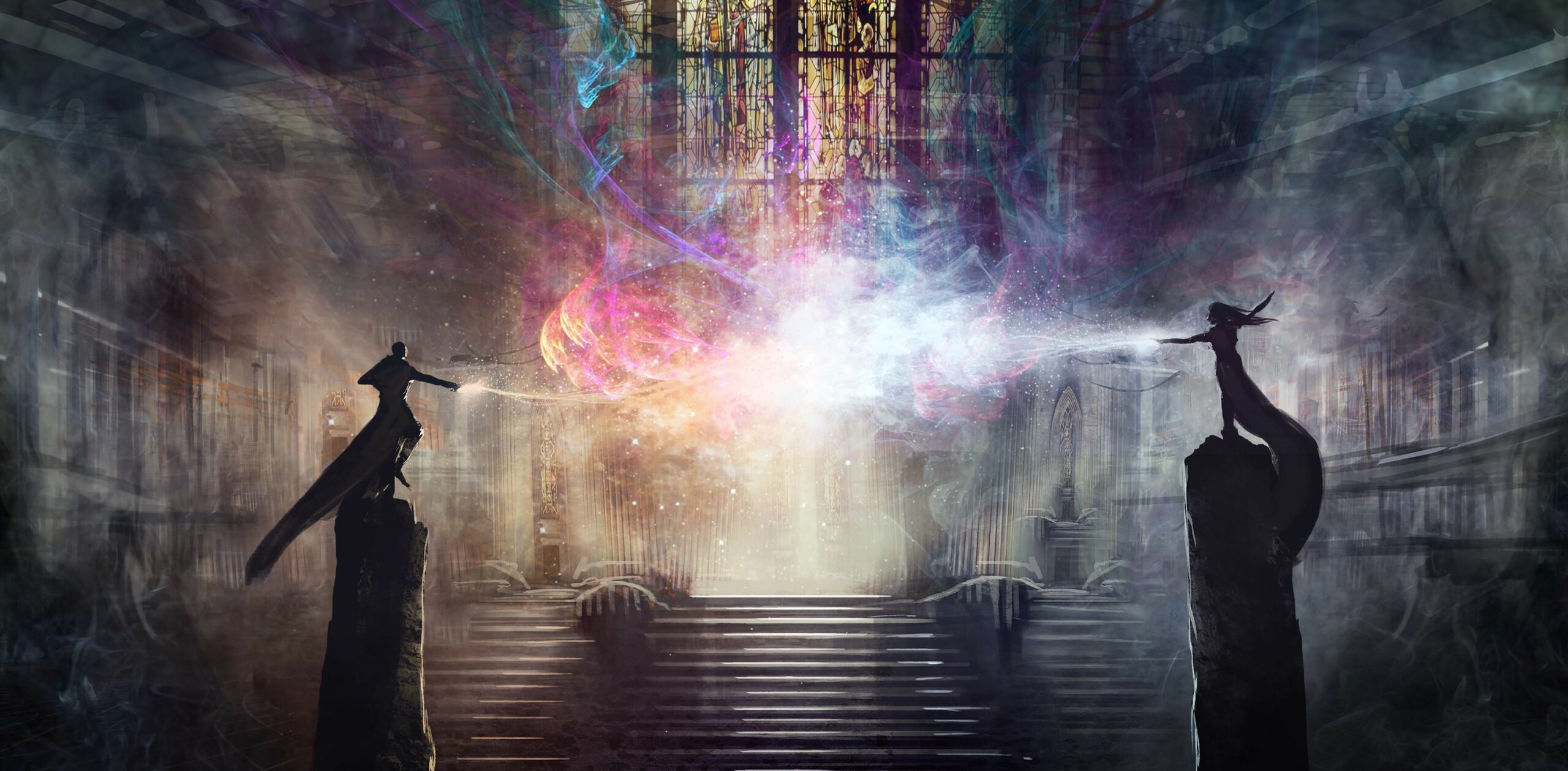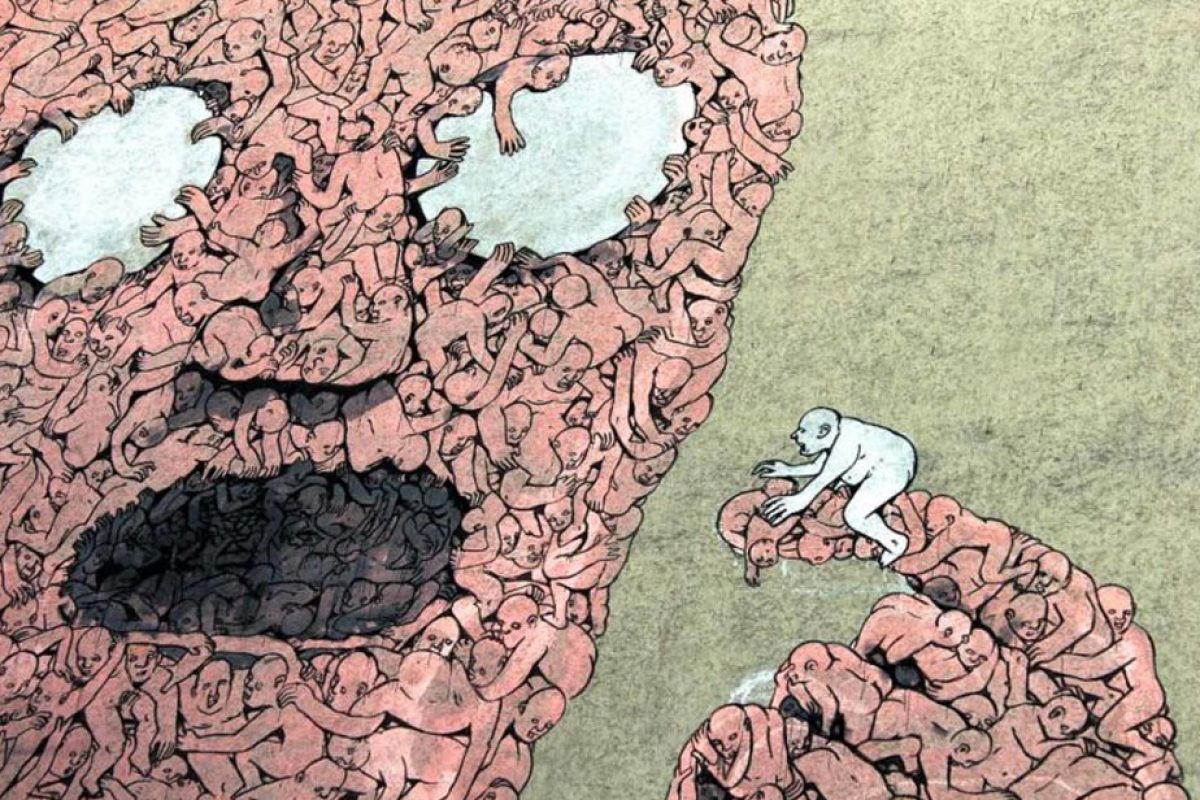There is a type of existential pain that comes with ‘not knowing who we are (and yet thinking we should know)’ and this is a type of pain that is manufactured in vast quantities by present day mass society (since in mass society everything is on the outside and nothing is in the inside, as Jung says). We are lost in the collective because we look to the group rather than looking to ourselves. Existential angst is always a feature of life (which is to say, we didn’t invent it with our modern ways) but it is nevertheless very much amplified (and then driven underground) by the way of life that we are currently embracing. Traditional cultures – it would seem – do not produce such an intense form of existential confusion with regard to who we are, and what we should be doing with our lives. We pride ourselves as knowing more than all the generations that preceded us, but we’re also the least ‘original’. We’re the least original because everyone is busy copying everyone else!
Oddly enough, we could say that this comes about because of the type of freedom that we didn’t have before, namely the freedom we have to construct ourselves in any way we choose. We are free to reinvent ourselves time and time again and this freedom is the source of our grievous insecurity. We can choose any way of looking at the world we want to – it’s a wide-open field – but the problem with this is that ‘if anything can be true then nothing is true’. If I am free to see anything at all as being ‘true’ then truth has been devalued; if I get to say what everything means then the sense of meaning that I end up with as a result is always going to be distinctly hollow. Reality is mocking me by obeying me.
Modern society provides us with all sorts of ways of constructing and presenting ourselves – we can – and do – shop for our identities, our sense of who we are, in a giant supermarket, so to speak. When we buy products because these products ‘say something about us’ we’re not just shopping for this product or that product, we’re shopping for ourselves. We’re shopping for an idea of ourselves (an ‘image’, as we say) so that we can present this image to the world and be accepted on this basis. This is clearly a pretty big deal, therefore. The need we have to say who we are (and have that identity recognised by our peers) is huge and it tends to override most other considerations in life; in effect, all we care about is the quick fix, which in this context essentially comes down to finding some sort of acceptable identity for ourselves.
This is a dreadfully hasty sort of a business therefore – it is not something we take our time with and for this reason we are, in our super-keenness to find a short-term solution, creating a long-term problem for ourselves. The pressure to quickly come up with an acceptable identity (an identity that gets us off the hook as regards the all-important matter of ‘fitting in’), combined with the ‘marketplace mentality’ that prevails in society results in us adopting that frame of mind in which we look for all our answers ‘on the outside’. This means that we’re basically being forced to obtain a ready-made, off-the-shelf image, but no matter what image we come up with it’s never going to be anything more than ‘the game that we are playing’. It’s never going to represent the truth of who we are, the realisation of which can’t be forced. Nothing true can be forced; if it has been forced then it’s a facsimile, a hollow token of the real thing…
Again, we might argue that this is a situation that humankind has never found itself in before. In a tightly-interlocked mass culture which is composed of millions upon millions of people – as Jung has noted – the value placed on the individual is zero and so our only option seems to be to conform to some convenient stereotype or other. When it seems like a mistake to take the time needed in order to allow ‘the individual we are’ to emerge (in an organic rather than an artificial fashion) then we have to seek refuge in the generic and it is this unexamined need to seek the answer in ‘the generic’ (which is what is for sale in the global marketplace) that has given rise to the crisis in mental health which we are slowly coming around to acknowledging in the Western world.
In order to discover who we are in an organic rather than a forced way we need to have the ability or willingness to tolerate mental discomfort and pain (in this case, the pain of ‘not knowing who we are or what we are about’) but because we live in a culture where: [1] Only the generic is valued and where [2] Suffering is seen as something to be ashamed of the painful process of disengaging from the consensus reality and growing beyond the limiting ideas that we have of ourselves the odds are very much stacked against us. We are doubly discouraged therefore – we are discouraged because pain is difficult and we don’t want it and we are discouraged because to be unhappy in (or to be ill at ease with) life in the artificial realm that is society is regarded as a sign of humiliating personal failure. Hence, Hermann Hesse states,
I realize today that nothing in the world is more distasteful to a man than to take the path that leads to himself.
If we say that the ‘artificial way of finding out who we are’ is to identify with some kind of ready-made template that the system provides for us (which is to say, by fitting neatly into a pre-existing slot) then the organic way must be to go through the challenges / uncertainties / difficulties of life without having a ready-made identity, without allowing ourselves to be defined by the consensus reality, without having to constantly defend who we arbitrarily say we are, thereby allowing our actual individuality to spontaneously emerge. This is as we have said the ‘more arduous option’ – this is the road less travelled that M Scott Peck talks about in his book of the same name. Rather than having the short-term advantage of the quick fix which is – as we have said – followed by the inevitable long-term cost – the cost here being the neurotic suffering that has been created by our unseemly rush to find a quick answer – we undergo the difficulty first, on a voluntary basis, and this way we get to enjoy the long-term ‘benefit’ later on in life. It all depends, as Scott Peck says, on whether we want to eat the icing on the cake before we get started on the rest (which is to say, it depends on whether we are trying to avail of the ‘pleasant’ aspect of life without ever experiencing the painful or challenging side).
Everything comes down to this question as to whether we’re willing to take the rough with the smooth, whether we are willing to take on the good times and the hard times. If we’re not then we’re going off half-cocked, we’re setting out in life on a false or mistaken basis, and that just isn’t going to work out for us. Without the willingness to take on the essential existential challenge in life (which no one else can help us with) we can’t actually live and so we’re going to do ‘something else’ instead; as Joseph Campbell says The Hero With A Thousand Faces, if we refuse ‘the Call to Adventure’ then nothing awaits us but endless futile neurotic suffering. The rush is to ‘get out there and live our best lives’ and we are understandably keen to make sure that we don’t miss out (since life is presented to us as a competition where the slow and the indecisive will inevitably fall by the wayside and miss out on all the good stuff). In this ‘un-philosophical haste’ we’re not allowed to take the time to actually question anything…
The ‘prize’ (so to speak) isn’t on the outside at all however – that’s just what we have been conditioned to believe. What is to be discovered is on the inside not the outside, and it certainly isn’t something that can be won by competing with others. We can’t compete to see ‘who is the best at being the unique individual that they potentially are’! There’s no way to determine such a thing, and – in any event – the moment we enter the competition we turn our backs on our true nature. We can only compete when there is a common goal, a goal that is the same for all of us, but if we define ourselves in relation to this common goal then we immediately go down the road of ‘being generic rather than being unique’. We’re working hard to ‘prove ourselves’ by optimizing our performance in the game but ‘who we are in the game’ – which as we’ve said is the same for all of us – has nothing whatsoever to do with who we are in reality. This renders everything we do absurd – we’re competing like mad for the prize that we all say is so great but the truth that we have to ignore here is that it doesn’t matter in the least whether we succeed or fail because it’s perfectly meaningless either way. The game is empty.
In terms of the game, ‘the struggle’ and ‘the prize’ are two separate things – we don’t like to struggle but we do like the prize and that is the only reason we take part in it. Generally speaking, in a mechanical society we don’t do our job because we find it meaningful or fulfilling but because we have our eye on the prize we will obtain for completing it successfully. Our attitude to the suffering is that we want to be rid of it, and this is why we hope to be successful in our struggle – because we don’t want to struggle anymore. We engage in finite play in order to bring that play to a close, says James Carse. This too is a manifestation of absurdity – we’ve got everything backwards so that we play in order to win life, which – as Carse says – means that until we win we’re not actually alive. Actually, the unresolved or un-concluded state of play is life, and so when I struggle to bring the play to the end I am also struggling to bring life to an end. The equilibrium state which we are striving so hard to arrive at isn’t life at all therefore but ‘death in disguise’. Thus, as the ancient Greek philosopher Heraclitus says,
Life has the name of life, but in reality it is death.
Our ‘hunger for an identity is the same thing as our desire to bring our existential uncertainty to an end, to a conclusion – once we’ve done this, we think, then we can finally get on with the important business of living. Firstly, I obtain an identity for myself, and then I live my life on the basis of this identity (which is – as we keep saying – ‘doing everything backwards’). What we don’t see in our haste to avoid the existential uncertainty (the constant state of ‘not knowing’ who we are) to which we are so averse to actually is life, whilst the equilibrium state (the defined self or ego) which we value so much, is – we might say – the stubborn refusal of life. We end up therefore playing ‘the waiting game’, which is where we wait for life to happen on our terms, which of course it never will…
Image – istockphoto.com






